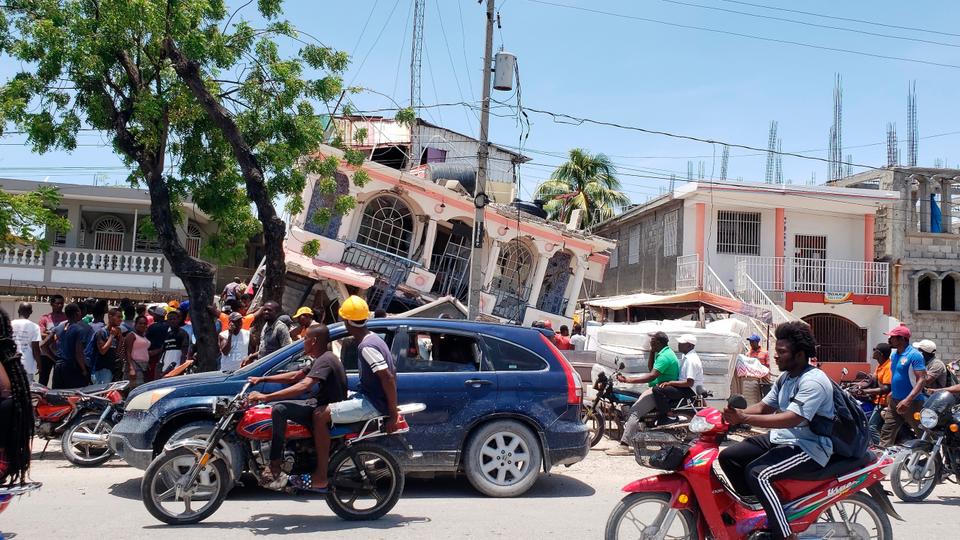At least 304 people died and hundreds were injured or missing after a major earthquake struck southwestern Haiti, authorities say, reducing churches, hotels and homes to rubble in the latest tragedy.

At least 304 people have died due to a powerful earthquake that struck Haiti, the country's civil protection agency said in an update to the toll.
"We have recorded 160 deaths in the South, 42 in Nippes, 100 in Grand'Anse and two in the Northwest," said civil protection head Jerry Chandler on Saturday, breaking down the death toll by department at a press briefing.
The magnitude 7.2 quake, which was followed by a series of aftershocks, struck 8 km (5 miles) from the town of Petit Trou de Nippes, about 150 km west of the capital Port-au-Prince, at a depth of 10 km, the United States Geological Survey said.
That made the temblor which was felt as far away as Cuba and Jamaica potentially bigger and shallower than the magnitude 7 earthquake 11 years ago that killed tens of thousands on the island.
This one - which occurred around 8:30 am local time - hit farther away from the capital, however. In Port-au-Prince, it was strongly felt but did not appear to have caused major damage, according to Reuters witnesses.
Still, Haiti's Civil Protection service said the preliminary death toll stood at 304, with at least 1,800 injured and Prime Minister Ariel Henry declared a month-long state of emergency.

Chandler, who heads the country's civil protection agency, announced the toll as the nation began counting the costs of the disaster.
The epicentre of the quake, which shook homes and sent people scrambling for protection, was about 100 miles (160 kilometres) by road from the centre of the densely populated capital Port-au-Prince.
"Lots of homes are destroyed, people are dead and some are at the hospital," Christella Saint Hilaire, who lives near the epicentre, told AFP.
Everyone is in the street now and the shocks keep coming."
Destruction to building seen in #Haiti when 7.0 magnitude #earthquake hits off the coast of Haiti pic.twitter.com/IHfFot2gcH
— Adnan Faheem, GPHR, SPHRi, SHRM-SCP (@AF2311) August 14, 2021
Felt across the Caribbean
The long, initial shock was felt in much of the Caribbean. It damaged schools as well as homes on Haiti's southwestern peninsula, according to images from witnesses.
Residents shared images on social media of the ruins of concrete buildings, including a church in which a ceremony was apparently under way on Saturday in the southwestern town of Les Anglais.
The USGS issued a tsunami warning, saying waves of up to three meters (nearly 10 feet) were possible along the coastline of Haiti, but it soon lifted the warning.
A magnitude-7.0 quake in January 2010 transformed much of Port-au-Prince and nearby cities into dusty ruins, killing more than 200,000 and injuring some 300,000 others.
More than a million and a half Haitians were made homeless, leaving island authorities and the international humanitarian community with a colossal challenge in a country lacking either a land registry or building codes.
US President Joe Biden approved "immediate" aid for Haiti.
"The president authorised an immediate US response, and named USAID Administrator Samantha Power ... to coordinate this effort," a senior White House official said, according to a pool report.
L’hôpital général aux Cayes est débordé. Beaucoup de blessés. Beaucoup de maisons se sont effondrées aux Cayes. Dont un hôtel.
— Frantz Duval (@Frantzduval) August 14, 2021
📷 Jose Flécher
Bilan partiel #Haiti #earthquake 14-08-21 pic.twitter.com/pze11oojI8
The quake destroyed hundreds of thousands of homes, as well as administrative buildings and schools, not to mention 60 percent of Haiti's health-care system.
The rebuilding of the country's main hospital remains incomplete, and nongovernmental organisations have struggled to make up for the state's many deficiencies.
The latest quake comes just over a month after President Jovenel Moise was assassinated in his home by a team of gunmen, shaking a country already battling poverty, spiralling gang violence and Covid-19.
Police say they have arrested 44 people in connection with the killing, including 12 Haitian police officers, 18 Colombians who were allegedly part of the commando team, and two Americans of Haitian descent.
The head of Moise's security detail is among those detained in connection with the plot allegedly organised by a group of Haitians with foreign ties.
Police have issued wanted-persons notices for several other people, including a judge from Haiti's highest court, a former senator and a businessman.
Moise had been ruling the impoverished and disaster-plagued nation by decree, as gang violence spiked and Covid-19 spread.
Social media is bold.
Social media is young.
Social media raises questions.
Social media is not satisfied with an answer.
Social media looks at the big picture.
Social media is interested in every detail.
social media is curious.
Social media is free.
Social media is irreplaceable.
But never irrelevant.
Social media is you.
(With input from news agency language)
If you like this story, share it with a friend!
We are a non-profit organization. Help us financially to keep our journalism free from government and corporate pressure















0 Comments